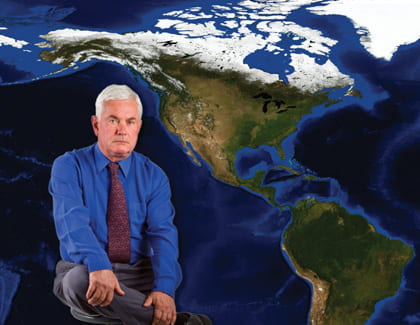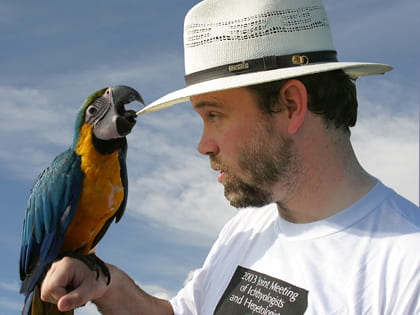Peace talks (2)
John Whiteley has been on a decades-long quest to find out how – and if – peace can be achieved in the nuclear age

Much has changed in the 25 years since UC Irvine social ecology professor John Whiteley interviewed the late psychologist B.F. Skinner for the first in a series about world peace. Cold War fears have been eclipsed by anxiety over terrorism. Technology has been transformed – their original conversation was videotaped in the University Club using the now-dated VHS format. And Whiteley himself is different; his already white hair is even whiter. Yet today, one thing remains the same: Whiteley is still on a quest for peace.
From 1983 to 1989, he taped about 200 half-hour interviews with a range of renowned individuals, including Norman Cousins, Condoleezza Rice, John Kenneth Galbraith, Donald Rumsfeld, Barry Goldwater, Shirley Chisholm, Julian Bond and Rollo May. The “Quest for Peace” segments were originally broadcast on U.S. cable and public access stations. In July, UCI Libraries launched the Quest for Peace Web site, featuring transcripts, bios and interviews of every segment.
“These interviews contain enduring insights that transcend the Cold War,” Whiteley says. “Many of the issues raised address the unmet challenges of achieving peace in any age.”
Indeed, many conversations could have taken place today. For instance, much of what terrorism expert Brian Jenkins tells Whiteley in 1988, 13 years before 9/11, proves chillingly prophetic. “[Terrorists] don’t necessarily have to go up into high-tech, more exotic weapons in order to carry out their attacks,” Jenkins says. “The one reason is they have virtually unlimited targets. Terrorists can attack anything, anywhere, anytime. Governments can’t protect everything everywhere all the time, and that asymmetry gives the terrorists an advantage.”
Whiteley was able to get high-profile people in education, psychology, religion, economics and other domains of society to participate because, he says, they knew their views would be respected, not edited into sound bites.
“They have wisdom they never get to share,” he says. “I was not prepared for the extraordinary outpouring of thought from people who didn’t want to accept the way the world was going.”


